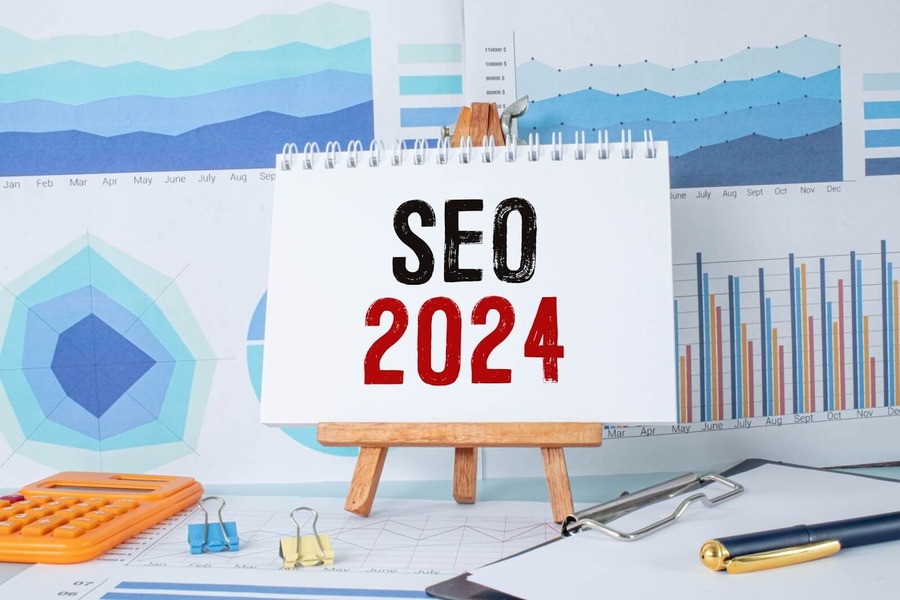Harikanth brings a blend of digital expertise and creative passion, working as an SEO Executive in the Loop Digital team. With a postgraduate qualification in Digital Business & Analytics and 2 years of experience in the digital marketing domain, he’s adept at crafting data-driven strategies to elevate website rankings and online presence. He constantly up-skills himself, keeping pace with the latest Google certifications & research to ensure clients benefit from the most cutting-edge strategies. Beyond the digital realm, Harikanth is a multi-talented individual. He fuels his competitive spirit by participating in marathons and excelling on the tennis court. When seeking a creative outlet, Harikanth expresses himself through dance and poetry. As an avid explorer and archeology lover, Harikanth is fascinated by uncovering the stories of the past through visiting historical sites and learning artefact histories.
Posted on 23/05/2024 by Harikanth Reddy
Top 15 SEO Trends for 2024
Read time: 11 mins
In today’s digital age, a strong online presence is crucial for businesses of all sizes. Search Engine Optimisation (SEO) remains an essential element for achieving that presence, driving organic traffic to your website, and ultimately, boosting conversions and sales.
However, the world of SEO is constantly evolving, with Google’s algorithms becoming increasingly sophisticated and user intent playing a more significant role than ever before. To stay ahead of the curve, businesses need to adapt their SEO strategies to embrace the latest trends.

The Importance of SEO
Before delving into the specifics, let’s revisit the significance of SEO. Studies consistently show that organic search remains the primary driver of website traffic, accounting for over 50% of all visits.
One of the defining characteristics of SEO is its constant evolution. Google’s search algorithms are updated hundreds of times a year, with a focus on providing the most relevant and user-centric search results possible. This means SEO strategies that worked yesterday might not be as effective today. Staying updated on the latest trends and adapting your approach is crucial for maintaining a competitive edge.
Table of Contents
- Search Generative Experience (SGE)
- Answer Engine Optimisation (AEO)
- Generative AI
- Building Topical Authority
- Google’s E-E-A-T and Ranking Algorithm
- AI Tools
- Video SEO
- Voice Search Optimisation
- Significance of User Experience (UX)
- Mobile-First Indexing
- Semantic Search & Natural Language Processing (NLP)
- Local SEO
- Influencer SEO
- Visual Search Optimisation
- Blockchain in SEO
Top SEO Trends for 2024
As we step into 2024, the realm of Search Engine Optimisation (SEO) continues to undergo significant transformations, driven by advancements in technology and shifts in user behaviour. Let’s delve into the top SEO trends poised to shape the digital landscape in 2024.
1. Search Generative Experience (SGE)

Search Generative Experience (SGE) is an experimental tool where Google not only displays links to websites but also provides summaries, answers, and additional content directly on the Search Engine Results Page (SERP). This vision behind the Search Generative Experience, where Google leverages generative AI to provide a more informative and user-centric search experience.
SGE has the potential to significantly impact search results. While users might find the information they need directly on the SERP, reducing clicks to websites, it emphasises the importance of comprehensive and informative content that directly addresses user queries. Content that anticipates user intent and provides complete answers will have a higher chance of being featured in SGE results.
Actionable Strategies for SGE
- Focus on User Intent: Conduct thorough keyword research to understand what users are searching for and craft content that directly answers their questions.
- Optimise for Diverse Formats: SGE results might include summaries, listicles, and infographics. Consider creating content in various formats to increase the chance of being featured.
- Prioritise Readability: Use clear and concise language with well-structured headings, subheadings, and bullet points for easy comprehension by AI systems.
2. Answer Engine Optimisation (AEO)
With SGE placing a premium on direct answers, AEO becomes a critical SEO strategy. AEO involves optimising content to appear in featured snippets and answer boxes at the top of SERPs.
Earning a featured snippet can significantly boost your click-through rate (CTR) and conversion rate as it positions your website prominently on the SERP. Studies show that featured snippets can improve CTR by as much as 31.3%.
Actionable Strategies
- Identify User Intent: Research existing featured snippets for your target keywords to understand the type of information Google prioritises.
- Structure for Readability: Use clear headings (H1, H2, H3) that align with user queries and answer sections within the content.
- Provide Concise Answers: Include short and informative answers within the content, formatted for readability in answer boxes (ideally under 30 words).
- Enrich with Visuals: Supplement your answers with high-quality images, videos, or tables to enhance understanding and break up text.
3. Generative AI

The rise of Generative AI is transforming content creation and SEO practices. These AI tools can assist with brainstorming ideas, conducting research, and even generating initial content drafts. Generative AI can significantly improve content creation efficiency by automating tasks like outline generation, and initial content drafts.
However, it’s important to remember that AI-generated content cannot replace human expertise and creativity. The key lies in leveraging AI for efficiency and using human oversight to refine content for accuracy, brand voice, and value.
Actionable Strategies
- Brainstorming Partner: Utilise AI tools to generate content ideas, identify trending topics, and conduct initial keyword research.
- Refine and Edit: Don’t rely solely on AI-generated drafts. Edit and refine content to ensure accuracy, high quality, and alignment with your brand voice.
- Focus on Expertise: Use AI for tasks where it excels, but focus human efforts on crafting high-value content that AI cannot replicate, such as in-depth analysis, expert insights, and unique data.
4. Building Topical Authority
In the current state of SEO, simply targeting a few keywords could not guarantee high search rankings. In 2024, Google prioritises websites that demonstrate topical authority. This refers to a website’s expertise, trustworthiness, and comprehensiveness on a specific topic.
Websites with strong topical authority are more likely to rank higher in search results for relevant keywords. Google recognises these websites as reliable sources of information, providing a better user experience.
Actionable Strategies
- Create a Topical Map: Develop a comprehensive plan outlining the main topics and subtopics relevant to your niche. Identify content gaps and opportunities to establish expertise.
- Content Depth: Go beyond superficial content. Create in-depth guides, case studies, and expert analysis to showcase your knowledge and understanding of the topic.
- Content Breadth: While in-depth content is crucial, ensure you also cover a variety of subtopics related to your main theme. This demonstrates comprehensiveness and caters to diverse user needs.
5. Google’s E-E-A-T and Ranking Algorithm
E-E-A-T stands for Experience, Expertise, Authoritativeness, and Trustworthiness. These are core principles that Google considers when ranking websites. Understanding E-E-A-T and how it aligns with the latest ranking algorithm is essential for SEO success.
Understanding E-E-A-T
- Experience: Demonstrates your website’s firsthand knowledge and practical application of the topic.
- Expertise: Demonstrates your website’s knowledge and understanding of the topic you cover.
- Authoritativeness: Establishes your website as a trusted source of information within your niche.
- Trustworthiness: Conveys to users that your website provides reliable and accurate information.
Ranking Algorithm Insights:
In addition to E-E-A-T, Google’s ranking algorithm considers various factors, such as Machine Learning (ML) and Web Core Vitals.
- Machine Learning: Machine learning algorithms analyse vast amounts of data to understand user intent and deliver the most relevant search results.
- Web Core Vitals: Google prioritises websites that offer a positive user experience, focusing on factors like mobile-friendliness, fast loading speeds, and overall website functionality.
Actionable Strategies:
- Author Bios: Showcase the expertise of your content creators with detailed author bios highlighting their credentials and experience.
- Backlinks from Credible Sites: Earning backlinks from high-authority websites in your niche demonstrates trust and authority.
- Optimise for Web Core Vitals: Ensure your website is mobile-friendly, loads quickly, and provides a seamless user experience.
6. AI Tools

AI-powered SEO toolkits streamline your workflow by aiding in keyword research, content optimisation, and competitor analysis. They help identify high-volume, low-competition keywords, suggest improvements for existing content, and uncover opportunities to outrank competitors through data-driven insights.
Leveraging AI has become a necessity. These tools can process vast amounts of data in seconds, providing valuable insights that would be time-consuming or even impossible to obtain manually. This allows you to make informed decisions about your SEO strategy, focus your efforts on high-impact tasks, and ultimately achieve better results in a shorter time frame.
Best Practices for Integration:
While AI tools offer valuable assistance, it’s crucial to integrate them effectively into your SEO workflow:
- Don’t rely solely on AI recommendations. Utilise them to inform your overall SEO strategy and decision-making.
- AI tools cannot replace human judgement. Use your expertise to analyse data, identify trends, and make strategic decisions.
- Double-check data provided by AI tools, particularly for keyword metrics and competitor analysis.
- Don’t be tempted to prioritise quantity over quality content based solely on AI suggestions.
7. Video SEO

Video content continues to be a dominant force online, and SEO strategies need to reflect this trend. Videos are highly engaging and can effectively capture user attention. A recent study revealed that including a video on a landing page can increase conversions by 86%. By incorporating video content into your SEO strategy, you can improve website dwell time, user engagement, and ultimately, search rankings.
Tips for Optimisation:
- Optimise Titles and Descriptions: Include relevant keywords in your video titles, descriptions, and meta tags to improve discoverability in search results.
- Target Long-Tail Keywords: Consider targeting long-tail keywords in your video content, as users often search for more specific video content.
- Transcripts and Closed Captions: Create transcripts and closed captions for your videos to improve accessibility and allow search engines to better understand video content.
8. Voice Search Optimisation

Voice search is rapidly becoming a preferred search method, particularly for mobile users. A staggering 27% of internet users now rely on voice search on their mobile devices, highlighting the increasing importance of optimising your website for this growing segment of online traffic.
Voice search queries tend to be phrased more naturally, using longer and more conversational language. Optimising for these nuances can significantly improve your website’s visibility for voice searches.
Tips for Optimisation:
- Long-Tail Keywords: As mentioned earlier, voice search queries often use long-tail keywords and natural language phrases.
- Focus on Local SEO: For voice searches with local intent (e.g., “best restaurants near me”), optimise your Google My Business profile and local listings.
- Conversational Content: Craft content that uses natural language and answers questions in a conversational tone, mimicking how users speak during voice searches.
9. Significance of User Experience (UX)
User experience (UX) is no longer an afterthought in SEO. Google prioritises websites that offer a positive user experience, impacting search rankings. A website that is easy to navigate, loads quickly, and provides a seamless experience is more likely to keep users engaged and encourage them to return. This positive user behaviour is a positive signal for search engines.
Techniques to Enhance UX:
- Mobile-First Design: Ensure your website is mobile-friendly and offers an optimal user experience for mobile devices.
- Fast Loading Speeds: Optimise website images, code, and plugins to ensure fast loading speeds for a smooth user experience.
- Clear Navigation: Structure your website with clear and intuitive navigation, allowing users to find the information they need easily.
- High-Quality Content: Provide valuable, informative, and engaging content that keeps users interested and coming back for more.
10. Mobile-First Indexing
In 2020, Google completed its shift to mobile-first indexing, prioritising the mobile version of your website for search results. This means if your website is not mobile-friendly, you’re missing out! Studies show that mobile internet usage now accounts for over 55% of all web traffic globally. A website that delivers a poor mobile experience is practically invisible in search results.
Strategies for Mobile Optimisation:
- Responsive Design: Implement a responsive web design that adapts seamlessly to different screen sizes and devices.
- Mobile-Friendly Testing Tools: Utilise Google’s Mobile-Friendly Test tool to identify and address any mobile usability issues.
- Fast Mobile Speeds: Optimise website elements specifically for mobile devices to ensure fast loading speeds.
11. Semantic Search & Natural Language Processing (NLP)
Many companies have dropped the practice of keyword stuffing. Today, search engines prioritise websites that understand user intent and provide content that aligns with their search queries. Semantic search and NLP are the two factors that influence the user’s search intent.
Semantic Search focuses on the meaning and context of a search query, rather than just matching keywords. In addition, Natural Language Processing (NLP) is the ability of computers to understand and interpret human language.
How to Leverage Semantic Search:
- Focus on Topics, Not Just Keywords: Research and identify relevant topics related to your niche and create content that comprehensively addresses these topics.
- Long-Tail Keywords: Target long-tail keywords that reflect how users naturally search for information.
- Entity Optimisation: Optimise your content by including relevant entities (people, places, things) related to your topic.
12. Local SEO
While the local SEO landscape constantly adapts, the core principle remains unchanged: increasing your online visibility within your local target market. Positive online reviews hold immense power, significantly impacting local search rankings and user trust.
In fact, 99.9% of consumers read online reviews before visiting a local business, and 77% of consumers trust online reviews as much as a personal recommendation. Encouraging satisfied customers to leave reviews is no longer optional, it’s a crucial element of any local SEO strategy.
Tips for Improving Local SEO Visibility:
- Claim and Optimise Google Business Profile: Claim your Google Business profile and ensure it is complete with accurate and up-to-date information, including your business name, address, phone number, website URL, and category listings.
- Local Citations: Acquire citations from local directories, online business listings, and relevant industry websites. Ensure your NAP (Name, Address, Phone number) consistency across all platforms.
- Location-Specific Content: Create content that caters to your local audience, including local events, promotions, and community news.
- Engage with Local Online Communities: Participate in relevant online forums, social media groups, and community events to build brand awareness and establish yourself as a local authority.
13. Influencer SEO
Partnering with relevant influencers in your industry can be a powerful SEO strategy. Influencer collaborations can expose your brand to a wider audience and increase brand awareness.
Earning backlinks from high-authority influencer websites can boost your website’s domain authority and SEO ranking. Influencers can help create engaging content that resonates with your target audience and promote it across their channels.
Studies show that around 59% of surveyed brands say they plan to increase their investment in influencer marketing in the next year. This highlights the growing recognition of influencer marketing’s effectiveness.
Strategies for Influencer Collaboration:
- Identify Relevant Influencers: Partner with influencers who align with your brand, target audience, and niche.
- Mutually Beneficial Collaborations: Develop influencer campaigns that offer value to both the influencer and your brand.
- Content Co-Creation: Work with influencers to create high-quality content that is informative, engaging, and optimised for SEO.
14. Visual Search Optimisation
With the rise of image-based search engines like Pinterest and Google Lens, optimising your visual content for search discovery is becoming increasingly important. Users are increasingly searching for information using images or screenshots. Optimising your visual content can help you reach this growing segment of online searchers.
Strategies for Visual Search Optimisation:
- High-Quality Images: Use high-resolution, visually appealing images that are relevant to your content.
- Image Titles and Descriptions: Include relevant keywords and descriptions within your image file names, alt tags, and captions.
- Image Sitemaps: Consider submitting an image sitemap to search engines to help them index your visual content effectively.
15. Blockchain in SEO
While still in its development stages, the potential integration of blockchain technology and SEO is the latest trend. Experts predict it could fundamentally reshape how search engines approach ranking and how websites build authority.
A recent study revealed that 42% of SEOs consider link-building the most challenging aspect of their work. Blockchain integration could alleviate these difficulties. Blockchain technology is a development worth keeping a close eye on to stay ahead of the curve in the ever-evolving SEO game.
How Can Loop Digital Help?
The SEO landscape is constantly shifting, and the key to success lies in adaptability. By staying informed about the latest trends and implementing effective strategies, you can ensure your website remains visible and competitive in search results.
At Loop Digital, we’re passionate about empowering businesses to thrive online. Let’s discuss your unique goals and craft a customised SEO and marketing strategy that leverages these cutting-edge trends, propelling your website to the top of search results and driving organic traffic.
We’ll delve into your specific needs and showcase how our data-driven SEO solutions, fueled by the latest trends, can deliver long-lasting success in the ever-evolving digital landscape. Secure your competitive edge and dominate your market. Schedule your exclusive consultation today and optimise your business to the latest SEO trends!
Looking for your next opportunity?
Digital marketing careers
We’re always on the lookout for talented individuals to join our ever growing team. If you think you’d be a great match for Loop Digital, we’d love to hear from you.

Join 300+ business owners getting weekly growth strategies - subscribe now.
"*" indicates required fields






